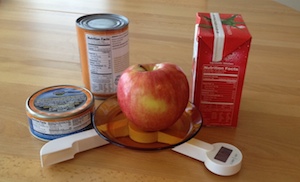
- Read Labels. We definitely have to know what we are putting in our mouths. Read the list of ingredients every time you buy. We always follow the caution: “When in doubt, leave it out.” If any of the ingredients are complicated or unrecognizable don’t use the product. The best idea is to keep it simple. We recognize real food ingredients when we see them. Stick with those.
- Weigh and Measure. This is how we put a boundary on the amount we eat. Take that scale to restaurants too. “Eyeballing” is inaccurate. The food plan is our prescription for abstinence; we want to be accurate and honest and our cups and scales ensure that accuracy. Food plan, no more, no less.
- Schedule Meals: This is critically important. If we go too long between meals, we experience irritation, hunger, and agitation from lowered blood glucose levels. There is real risk of relapse in these situations. Eat every 4-1/2 to 5 hours to maintain a level metabolism.
- Variety. Eat a variety of different foods. Getting stuck on one particular food may indicate that it is triggering addiction. Also any food eaten too frequently may cause allergies. It is for this reason that we limit the use of eggs. It is tempting to eat them frequently for breakfast. Because they are allergenic in nature, we limit exposure to them.
- Restaurant Orders. Give clear directions when ordering in a restaurant. Seafood is a fairly safe choice when ordered carefully. This is how to order: Salmon, no added fat, marinade or seasoning, plain baked potato, large salad with oil and vinegar, no balsamic vinegar please. Keep questions to a minimum, they are confusing. I avoid chicken in most restaurants because it is injected with things we don’t want to eat. Be careful of marinades. One of the popular Chinese Restaurants marinade all their proteins. Most restaurants fry food in butter, therefore we order with “no added fat”. Seasonings are suspect, don’t use theirs, take your own in your restaurant bag. I carry Penzy’s Northwoods. Balsamic vinegar contains a lot of sugar. We certainly want to abstain from that! Don’t drink carbonated beverages served at bars through a hose. Those hoses deliver sugary drinks too.
- Accountability. Report your food plan to an experienced sponsor or accountability partner. Be ready for some corrections or feedback if you are new. Some of the things to watch out for if you are helping a newer person: is the cottage cheese clean; the dairy non fat; the protein low fat (I really don’t encourage chicken thighs); what kind of oats; is there a variety of food or the same thing day after day?
- Attend Meetings. “Meeting makers, make it!” Getting together with others in recovery provides the support we need to stay abstinent, one day at a time.